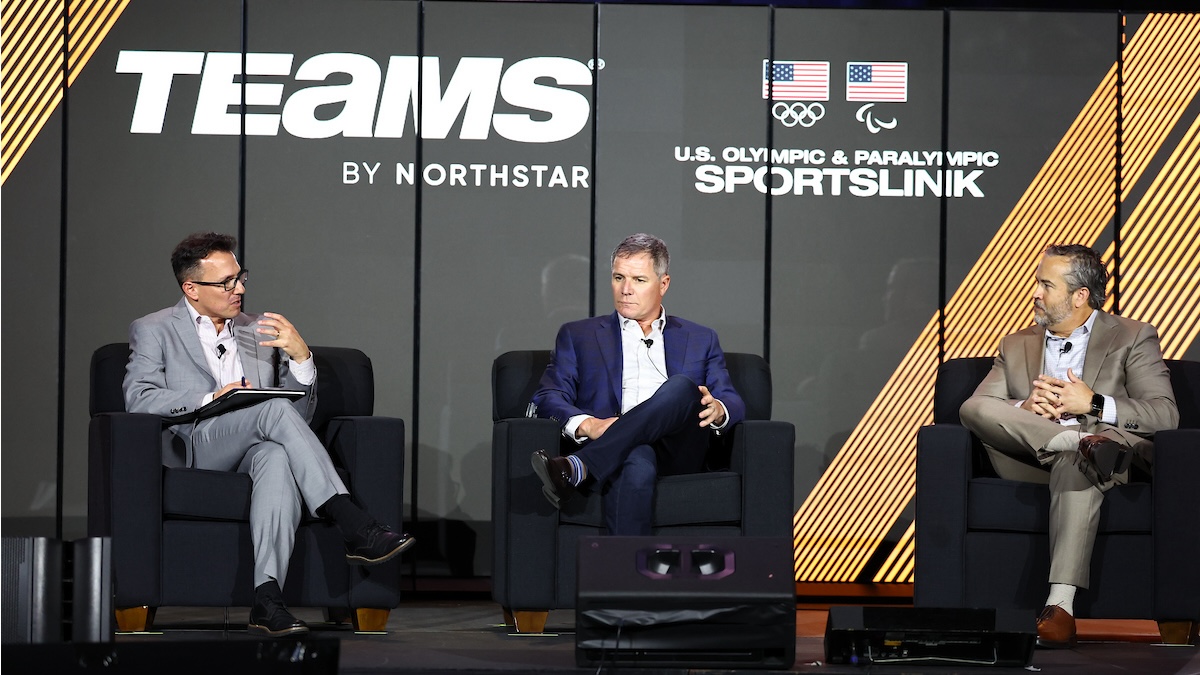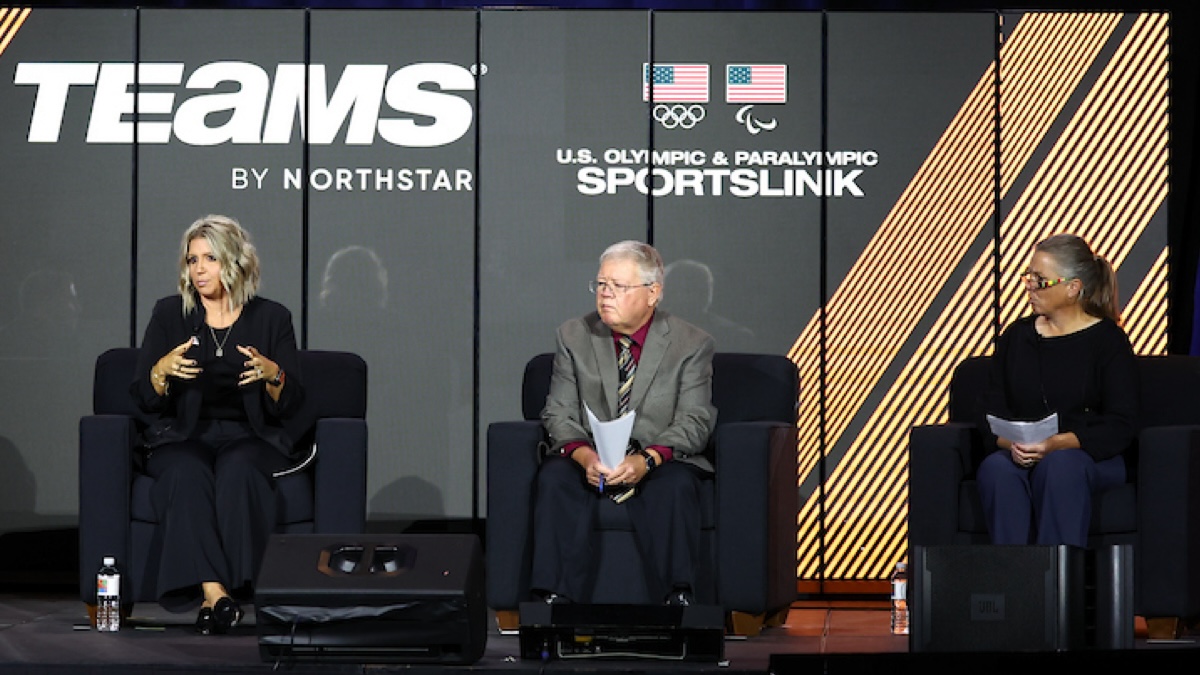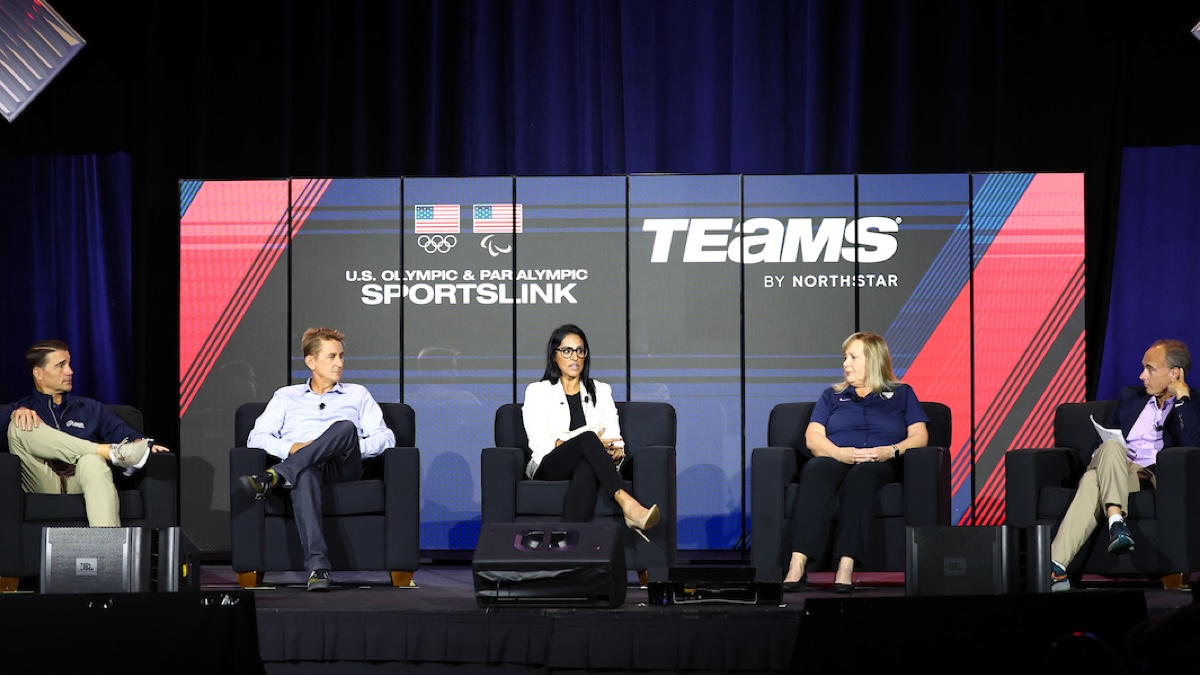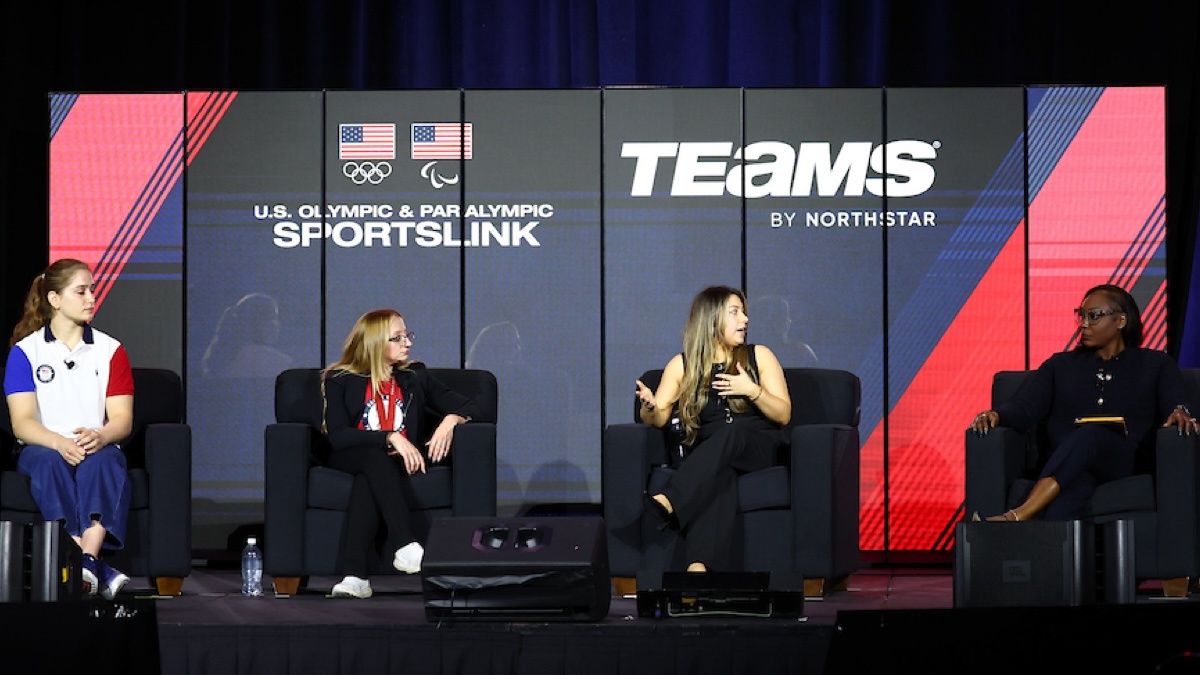
With several mega sports events on the horizon for North America — including the World Cup and the Olympic and Paralympic Games — industry leaders share their thoughts on how these events are driving important travel policy discussions, how destinations should position themselves for the future when it comes to sports, what your destinations and events should think about in anticipation of the events to come, and how the rising profile of sports will allow you to advocate for the work you do for your communities, participants and clients.
This session is sponsored by Greater Columbus Sports Commission, Greater Birmingham Convention and Visitor’s Bureau, Sports Milwaukee, Sports Pittsburgh, Visit Atlantic City and the Atlantic City Sports Commission.
The Speakers
Sponsored Content
Geoff Freeman, President and CEO, U.S. Travel Association: Freeman is the leading advocate for the $1.1 trillion U.S. travel and hospitality industry. In this role, Freeman is charged with ensuring the industry’s full recovery from COVID-19, positioning the industry to seize emerging opportunities in a post-pandemic market environment and further establishing travel as a vital economic force in the United States.
What They Said
John David: “In the sports vertical, we’re seeing the highest demand for travel that we’ve ever seen. Every level of grassroots sports participation is up, and those kids are going to start traveling for sports events in the near future. … I kept asking DMOs which vertical is leading the way, and 63% said sports is the top room night generator, which is great to see. In 2023 there were 205 million travels related to sports, and I think that number might be low. … As we get closer to these major events, the business model is critical, as is transportation. We need to maximize this opportunity. We have a perfect storm in the sports industry, and and we need to be focusing on the fact that there’s a great desire for people to travel to the United States. … In sports tourism we’re planting seeds and telling the stories of destinations that people will remember.”
Geoff Freeman: “The best thing to come out of the pandemic is that travel is no longer a leisure expense, but a need people have. The question is how do we make sports travel sustainable and keep the demand for years to come, and how do we make travel easier and more enjoyable? … Copa America was a wake up call and some of the things that happened there have raised concerns over the World Cup. We have to be ready to seize whatever opportunities we have. … People would rather go the DMV than the airport because of the hassle factor, and that’s a huge challenge of how can we improve the flying experience. It’s something that needs our attention as we prepare for these massive sporting events. … The local and state levels understand how important the tourism industry is, but something happens along the way to Washington (D.C.), and there’s a lot of work to do with that going forward.”
The Road to NCAA Championship Sanctioning

The NCAA is in a transformative era and that includes its championship landscape. Acrobatics and tumbling, equestrian, rugby, stunt, triathlon and women’s wrestling are working their way through the NCAA’s Emerging Sports for Women program with the hopes of gaining enough university participation to become NCAA championships — with some on the cusp of joining the ranks. This session included insight from the leaders of these efforts on where they are in the process and what destinations can do now to help build out other events leading up to a championship.
This session is sponsored by the Rhode Island Sports Commission
The Speakers
Amy Haney, Director of STUNT (West, Mid-South, and Southeast), USA Cheer: Haney joined USA Cheer in 2020 as the director of college STUNT and now serves as the director of STUNT. She has held a seat on the board of the College STUNT Coaches Association and the College STUNT Rules Committee. Haney was previously director of spirit programs and head STUNT coach for Concordia University Irvine.
Amy Rusert, Executive Director, National Intercollegiate Rugby Association: Rusert has been the executive director for the National Intercollegiate Rugby Association since 2018. Her roles have included competition management, advocacy, outreach and event production. While on staff with USA Rugby in the late 1990s, Rusert initiated the NCAA Emerging Sports process for the sport of rugby.
What They Said
Gary Abbott: “By getting the official sanctioning it will help us get more official programs … Once we have that ability to say ‘on this date every year you’ll see the NCAA women’s championship and your school will get that recognition,’ it’ll grow the sport even faster. … Our women have had the opportunity to be an Olympic champion but not be an NCAA champion. It’s all about the athletes and having the ability for them to pursue their dreams and stand on top of the podium as an NCAA champion.”
Amy Haney: “For STUNT, creating more opportunities for female athletes, the validation of getting through the NCAA process and then being a championship sport will open doors for more female athletes. … For not only myself but our staff and the people that have come before us, to see all of that hard work pay off for the athletes, that’s what we’re looking forward to the most. I think (NCAA) championship status will bring more resources not only for the current athletes but athletes for the future.”
Amy Rusert: “We help with that part of Title IX which is equitable participation standards … We produce divisional championships every November and we have had them historically at our member institutions. That is our standing event weekend and will be so until the NCAA fully takes over … This is all about the student-athlete experience and getting them to the place where they can be an NCAA champion.”
Making a Big Olympic Impression

The 2028 Olympic and Paralympic Games program in Los Angeles will include several sports making their debut, or appearing for the first time in generations. Executives of these sports discuss how they plan to make the most of the Olympics and Paralympics — and a U.S.-based event at that. And learn what this new exposure will mean for event organizers and potential future host cities as these sports prepare for their lead-up to the Games.
This session is sponsored by Sports Milwaukee
The Moderator
David Patterson, Senior Governance Advisor, U.S. Olympic & Paralympic Committee: Patterson works with all 50 NGBs as well as internally with the USOPC on all governance matters, ranging from compliance to optimal organization design in sport organizations. Prior to working at the USOPC, he worked in multisport games in Canada, with the Canadian Olympic Committee and led two Canadian NGBs as the CEO.
The Speakers
Fara Gorsi, Development Manager, International Cricket Council Americas: Gorsi has been responsible on behalf of cricket’s global governing body for overseeing the growth and development of the sport cricket in the Americas, including 16 countries in the Western Hemisphere. She works to maintain professional relationships with all international sports governing bodies and provides support and guidance to all crucial stakeholders of cricket, including NGBs.
Scott Hallenbeck, CEO and Executive Director, USA Football: Hallenbeck has led USA Football since 2005. He oversees all aspects of USA Football, guiding its nonprofit mission through premier educational, development, and competitive programs for American football, including tackle and flag football. Under Hallenbeck’s leadership, USA Football has enrolled 6,000 youth football organizations, reaching more than 250,000 coaches and 1.5 million players.
Marc Norman, CEO, USA Climbing: Norman became CEO of USA Climbing in August 2018 and since that time has grown revenue by nearly 100 precent; creation of a five-year strategic plan; development and implementation of USA Climbing’s first high-performance plan and subsequent high performance department; the establishment of DEI and Medical Committees; and the creation of the USA Climbing Foundation.
What They Said
Kim Clearkin: “People play squash generally to go to an Ivy League college. Now, we’ve got a gold medal that’s there, it’s a real thing that somebody will be able to be the first person to win an Olympic squash gold medal. From a high-performance side, our pipeline will become more robust. We feel we’ve got a shot at that gold medal.”
Fran Gorsi: “We’ve hosted the ICC T20 Men’s World Cup in Texas, Florida and New York bringing the elite in cricket and some of the oldest rivalries in sport … that is the energy we look to bring to LA28. We’ll definitely bring the cricket carnival to LA28. … For an international federation, the impact of being on the Olympic program is a bit different. We, as an international federation, can go into non-traditional markets and talk about cricket. We have a lot on our plates over the next four years.”
Scott Hallenbeck: “For 20 years we’ve been trying to grow tackle football around the world. … it’s very easy to get (flag football) going and there’s incredible enthusiasm not only domestically but around the world. … We’re athlete-centric and coach-centric. We want to build the infrastructure for the game and build it the right way. We’re literally and figuratively building out this pathway from a development standpoint.”
Marc Norman: “We’re so excited to show the world what para climbers can do … We have 650 climbing gyms in this country and are growing around 15% a year. … For us, a big piece is growing the awareness of it being an Olympic sport and being a sport that is growing and accessible. Our para community is so excited, would they come to your community event? Yes, they are all-in. They’re so excited for their opportunities.”
Women’s Sports Continue Upward Trajectory

There has never been a bigger spotlight on women’s sports, which has been a huge driver for U.S. Olympic and Paralympic success for decades. At the professional level, leagues in basketball, soccer, volleyball and softball, among others, are flourishing. Team USA, which again saw a majority of women making up the team, is seeing a similar effect with athletes becoming household names even in years when the Games aren’t held.
The Moderator
Whitney Ashley, Athlete Marketing and Relations, U.S. Olympic & Paralympic Committee: Ashley represented Team USA at four consecutive global championships and earned a spot on the U.S. Olympic Team for the 2016 Summer Olympics in Rio de Janeiro, Brazil. Today, she markets the athletes of the Olympics and Paralympics marketing, working as a public speaker and advocating for mental health, fitness and wellness.
The Speakers
Amit Elor, Olympian: Elor is a U.S. Olympian who won a gold medal at the 2024 Olympic Summer Games in the 68kg wrestling division. She also won gold at 72kg at the 2023 and 2022 Senior World Championships. She is an eight-time gold medalist overall at World Championship events across the U17, U20, U23 and Senior age divisions — including the freestyle and beach wrestling disciplines.
Lala Ismailova, Associate Director, JTA Pacific: Since joining JTA Pacific in 2019, Ismailova has worked on numerous high-profile campaigns including for USA Track & Field, USA Swimming, USA Gymnastics, the LA28 Olympic and Paralympic Games Organizing Committee, the City of LA’s PlayLA Adaptive Youth Sports Program, the New York New Jersey 2026 World Cup Host Committee and the Houston 2026 World Cup Bid Committee.
What They Said
McKenzie Coan: “I remember watching some of the older girls on the swim team, and then watching the summer Olympics on TV and then I started paying more attention to the broader landscape. I was inspired by people like Natalie Coughlin and Shawn Johnson. I see the Caitlin Clarks of the world out there making a difference; Alex Morgan has done so much for women’s sports. It’s exciting to see how far it’s coming, the impact it’s making and thinking about where we’ll be a decade from now. … You’ve seen the Paralympic movement blow up in the past few years, and it’s been incredible to see brands excited to work with us. A decade ago, women were brought on to fill a quota, but now it’s different because you see powerful female athletes representing amazing brands.”
Amit Elor: “Wrestling is a traditionally male dominated sport, and I was the only girl on my team until middle school. Now, I see rooms full of young girls who are wrestling, and it makes me so happy to see women’s wrestling gaining popularity. … I was a very shy kid and was opposed to the idea of social media and I didn’t want to put personal stuff out there. But seeing the power that social media can have on the young girls in our sport, it’s made me more comfortable to be on there and be myself. It gave me a lot of confidence and I grew and learned a lot from other athletes on there. … Sports make you a strong person in all areas of life. Once you’ve wrestled, everything else in life is easier, and I think that’s true of all sports.”
Lala Ismailova: “You can’t talk about sports without talking about women’s sports – that’s how far we’ve come. The trends we’re seeing are increased fan engagement, more interest from sponsors and partners and investment in teams and leagues. That’s a perfect recipe for a growing market. … Social media has been such a game changer because you can build your profile as an athlete and engage with new fans. Traditional media then sees that and realizes how much momentum is there. We need promotion of women’s sports and more games on during primetime when people are watching. … Gender equality is something we talk about all the time nowadays, so why would sports be any different? There’s now an authenticity to it.”












 Copyright © 2025 by Northstar Travel Media LLC. All Rights Reserved. 301 Route 17 N, Suite 1150, Rutherford, NJ 07070 USA | Telephone: (201) 902-2000
Copyright © 2025 by Northstar Travel Media LLC. All Rights Reserved. 301 Route 17 N, Suite 1150, Rutherford, NJ 07070 USA | Telephone: (201) 902-2000